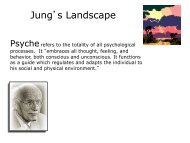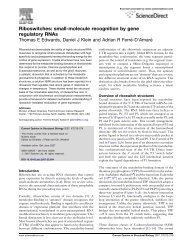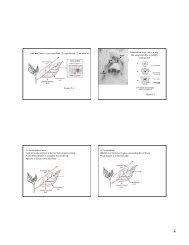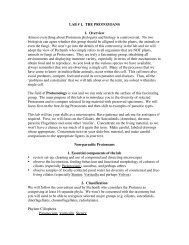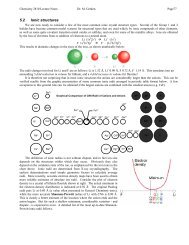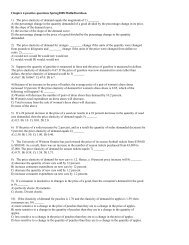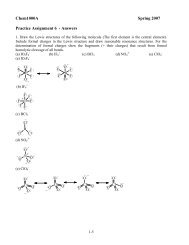Chap. 4: How Can I Know What Is Right? - University of Lethbridge
Chap. 4: How Can I Know What Is Right? - University of Lethbridge
Chap. 4: How Can I Know What Is Right? - University of Lethbridge
You also want an ePaper? Increase the reach of your titles
YUMPU automatically turns print PDFs into web optimized ePapers that Google loves.
<strong>University</strong> <strong>of</strong> <strong>Lethbridge</strong> --- Department <strong>of</strong> Philosophy<br />
Philosophy 1000B: Introduction to Philosophy<br />
Spring 2005<br />
Pr<strong>of</strong>. Kent Peacock<br />
Week 3: (Jan. 25, 27)<br />
<strong>Chap</strong>ter 3: <strong>How</strong> <strong>Can</strong> I <strong>Know</strong> <strong>What</strong> is <strong>Right</strong>?<br />
Introduction (3.1)<br />
In this chapter we look at some basic theories <strong>of</strong> ethics, or the principles <strong>of</strong> right and good<br />
conduct.<br />
3.2 Kant and the Categorical Imperative<br />
Immanuel Kant (1724-1804) is one <strong>of</strong> the most influential <strong>of</strong> modern philosophers. Here we<br />
only take a brief and introductory look at his ethical theory, which is <strong>of</strong> great subtlety, and can<br />
only be fully understood in the context <strong>of</strong> his metaphysics and epistemology.<br />
Key Points <strong>of</strong> Kant's Ethical Theory<br />
• The only thing that is good without qualification is a "good will" -- a good intention.<br />
• Whether or not a will is good is something that can be rationally understood; it is not<br />
merely a matter <strong>of</strong> feelings.<br />
• An intention or will is good if the "maxim" (rule) that it follows can be universalized; this<br />
means that it could apply to everyone without contradiction.<br />
• Implicit in this is the idea that all autonomous beings are <strong>of</strong> equal moral worth, or equal<br />
“instrinsic value”.<br />
o For example: a rule that said I could lie sometimes if it suited my purposes could<br />
not be universalized, since it would subvert the very conditions <strong>of</strong> trust that would<br />
sometimes make lying an effective strategy.<br />
• This is the categorical imperative (CI): "Act only on that maxim through which you can<br />
at the same time [without logical inconsistency] will that it should become a universal<br />
law."<br />
• A categorical imperative is one that holds without qualification; e.g., "At all times, be<br />
trustworthy."<br />
• A hypothetical imperative is one that depends on an "if"; e.g., "if you want to be trusted,<br />
be trustworthy."<br />
• Thus, ethical acts can in large part be identified by their adherence to a formal or logical<br />
principle!<br />
1 <strong>of</strong> 8
• Also central to Kant was the rule that people (autonomous beings) should be treated as<br />
ends, not means. (This would rule out slavery as morally acceptable.)<br />
• <strong>What</strong> counts for whether or not an act was good are not its results, but whether or not it<br />
was done through a good will.<br />
• The highest motive is duty, which can be defined as reverence for the principle <strong>of</strong><br />
universalizable law. (See footnote 2, pp. 86–87, for Kant's explanation <strong>of</strong> "reverence".)<br />
Other emotions are secondary.<br />
• Kant had a second formulation <strong>of</strong> the Categorical Imperative: “Act in such a way that<br />
you always treat humanity, whether in your own person or in the person <strong>of</strong> any other,<br />
never simply as a means, but always at the same time as an end.” 1<br />
o The logical connection to the first formulation is not clear, but is something like<br />
this: to treat myself as means only would be contradictory, and for this to be<br />
universal it must apply to all.<br />
o Roughly speaking, it says “Don’t use people nor allow yourself to be used;” Kant<br />
should therefore have been strongly opposed to slavery (though I am not aware if<br />
he spoke out against it himself).<br />
Advantages <strong>of</strong> Kant's theory:<br />
• Captures very clearly the important idea <strong>of</strong> duty.<br />
• Captures the importance <strong>of</strong> intention; this is, for instance, crucial in criminal law.<br />
• Brings out the importance <strong>of</strong> universalizability, which suggests that ethical behaviour is<br />
<strong>of</strong> its very nature impartial and fair; can be viewed as a form <strong>of</strong> the Golden Rule: "do<br />
unto others as you would have them do unto you."<br />
• Has a strong emphasis on human dignity, human rights, and individual worth.<br />
• Brings out the ethical intuition that we will sometimes feel an obligation to do something<br />
(e.g., fulfill an onerous promise) even if we are not emotionally inclined to do it, apart<br />
from our "reverence for the law".<br />
• It is very convenient and comprehensible to state ethical principles in as lists <strong>of</strong> duties,<br />
even if they may have some other philosophical basis.<br />
Problems with Kant's theory:<br />
• Does not give a clear method <strong>of</strong> distinguishing between conflicting duties; what if I have<br />
to lie in order to save someone's life?<br />
• Seems to excessively downplay the role <strong>of</strong> emotion, especially kindly feelings such as<br />
compassion.<br />
• Seems questionable that the results <strong>of</strong> actions are always irrelevant in judging their moral<br />
worth; “Oops, I didn’t mean to cause that three-car crash” just won’t cut it in court.<br />
• It could set a standard that is impossible for most people.<br />
1 This particular wording is from The Moral Law: Kant’s Groundwork <strong>of</strong> the Metaphysic <strong>of</strong> Morals, translated and<br />
analysed by H. J. Paton. (London: Hutchinson <strong>University</strong> Library, 1948, p. 32. (Page reference to p/bk edition <strong>of</strong><br />
1951.)<br />
2 <strong>of</strong> 8
3.3 Utilitarianism<br />
At opposite poles to Kantian ethics in many ways; but also very influential and widely used. It<br />
was formulated by Jeremy Bentham (1748-1832) and John Stuart Mill (1806-1873).<br />
Key Points <strong>of</strong> Utilitarianism<br />
• Rejects abstract talk <strong>of</strong> rights, justice, and intrinsic values. Bentham said that notions <strong>of</strong><br />
rights are "nonsense on stilts".<br />
• Instead, it says that good is simply pleasure (broadly conceived to include any kind <strong>of</strong><br />
personal benefit), while evil is pain and harm.<br />
• Good (pleasure) is sometimes called "utility;" pain "disutility."<br />
• Assumes that utility can be quantified and measured.<br />
• Assumes that utilities and disutilities can be added up like debits and credits in<br />
accounting.<br />
• Employs two deontic ethical principles:<br />
o Everyone counts the same, so that the utility or disutility that my pleasure or pain<br />
contributes to the grant total for my society is not weighted by who I am.<br />
o The Principle <strong>of</strong> Utility: act in such a way as to produce the greatest utility<br />
(happiness) for the greatest number <strong>of</strong> people.<br />
• (Note that it can't get <strong>of</strong>f the ground without a deontic kick-start!)<br />
• There are two main kinds <strong>of</strong> utilitarianism:<br />
o<br />
o<br />
Act utilitarianism, which judges each individual act by its consequences.<br />
Rule utilitarianism, which sets up rules (such as “do not steal”); it ends up being<br />
very similar to duty ethics in its form, but the rules are based on a calculation that<br />
they will in all probability lead usually to the greatest good for the greatest<br />
number, rather than on some abstract deontic principle.<br />
Advantages <strong>of</strong> Utilitarianism<br />
• Gives a fairly practical means <strong>of</strong> arriving at compromise decisions in matters <strong>of</strong> public<br />
policy, when there are competing viewpoints and values.<br />
• Embodies the idea that consequences for human welfare matter at least as much as good<br />
or bad intentions.<br />
Problems with Utilitarianism<br />
• May lead us to advocate acts (such as expropriation <strong>of</strong> land) which are unjust or a<br />
violation <strong>of</strong> personal rights, if they are supposedly for the greater good.<br />
• It is unclear that utility can be quantified, or that, if it can, it is additive (since there may<br />
be nonlinearities).<br />
• It is very hard to avoid bias in doing utilitarian cost-benefit analyses.<br />
3.4 A brief comment on Nietzsche:<br />
Two selections: Beyond Good and Evil, and On the Genealogy <strong>of</strong> Morality.<br />
3 <strong>of</strong> 8
The latter consists very nearly <strong>of</strong> ravings, some <strong>of</strong> which are <strong>of</strong> a rather racist character, and I am<br />
not quite sure why it was included in the book.<br />
In Beyond Good and Evil one can at least tell what he is talking about, and it is written in<br />
powerful and at times poetic language. We read Nietzsche for several reasons: the fact that he<br />
was very influential, the literary value <strong>of</strong> his writing, and -- most important from our perspective<br />
as philosophers -- we need to understand the basis <strong>of</strong> views that are as influential as his even if<br />
we don't like or agree with them. It is not doing good philosophy merely to reject an author<br />
because you don't like or agree with him or her; if you think Nietzsche is wrong, how then would<br />
you refute him?<br />
Some basic points:<br />
• Nietzsche rejects the whole conception <strong>of</strong> morality and ethics as it is usually understood,<br />
whether deontic or utilitarian.<br />
• He says that there is the morality <strong>of</strong> slaves, and the morality <strong>of</strong> masters (the noble); and<br />
that virtually any system <strong>of</strong> thought that justifies caring for the weak is a "slave"<br />
morality, a rationalization by slaves themselves for why they should not be exploited by<br />
the "noble" people.<br />
• Nietzsche's philosophy may have influenced Nazi ideology.<br />
He bases his views on an understanding <strong>of</strong> biology: he says that systems <strong>of</strong> morality that teach<br />
cooperation, charity, etc., are "anti-life", because, he says,<br />
"life itself is essentially appropriation, injury, overpowering <strong>of</strong> the strange and<br />
weaker, suppression, severity, imposition <strong>of</strong> one's own forms, incorporation, and,<br />
at the least and mildest, exploitation... life is will to power..." (111)<br />
<strong>Is</strong> this right? I would argue that Nietzsche had his biology wrong; for he failed to notice that life<br />
also involves "symbiosis" -- modes <strong>of</strong> cooperation. It is the interplay between cooperation and<br />
competition, not pure competition, that defines life. An awareness <strong>of</strong> this fact might support<br />
quite a different type <strong>of</strong> ethic than Nietzsche's worship <strong>of</strong> power.<br />
3.5 Ethic <strong>of</strong> Care versus Ethic <strong>of</strong> <strong>Right</strong>s<br />
Key points:<br />
• Inspired by work <strong>of</strong> Carol Gilligan (In a Different Voice: Psychological Theory and<br />
Women’s Development (Cambridge, MA: Harvard <strong>University</strong> Press, 1982.)<br />
o A work <strong>of</strong> descriptive psychology, not philosophy as such, but it has inspired a lot<br />
<strong>of</strong> philosophical work in feminist ethical thought.<br />
o Gilligan argued that our understanding <strong>of</strong> moral reasoning is biased because it is<br />
based mostly on what how males think or studied <strong>of</strong> male behaviour.<br />
o Claimed that her empirical studies showed interestingly different behaviour<br />
characteristic <strong>of</strong> women and girls, compared to males.<br />
o Males: tend to solve moral problems on the basis <strong>of</strong> universal rules, justice,<br />
rights, duties, rational calculation.; (little Kantians!). Moral dilemmas are “math<br />
problems with humans” (111).<br />
4 <strong>of</strong> 8
o Females: tend to solve problems on the basis <strong>of</strong> feelings (such as compassion),<br />
trust, and prevention <strong>of</strong> pain rather than necessarily doing the “right” thing; tend<br />
to judge problems on an individual basis rather than on basis <strong>of</strong> universal,<br />
invariable rules<br />
o According to Gilligan, males tend to see moral problems as zero-sum (winner and<br />
a loser); a competitive model; while women tend to see problems as positive-sum<br />
(we can all win); cooperative model.<br />
o See description <strong>of</strong> Heinz problem in text, pp. 108–109.<br />
• Thus, ethics <strong>of</strong> care is one which is based on these typically (or supposedly) feminine<br />
virtues.<br />
• Problems:<br />
o Was Gilligan empirically correct? <strong>Is</strong> this an accurate description <strong>of</strong> how girls and<br />
boys actually act? And if so, how much <strong>of</strong> it is due to “nurture,” versus “nature”?<br />
o Might reinforce stereotyping <strong>of</strong> women (as the caregivers <strong>of</strong> society) and thus go<br />
against equality, removal <strong>of</strong> old barriers and prejudices.<br />
o We can’t ignore the importance <strong>of</strong> justice; much <strong>of</strong> feminist criticism <strong>of</strong> maledominated<br />
institutions, for instance, is based on concern for justice, fairness, and<br />
equality — typically deontic concerns.<br />
o Perhaps what we need is a blend <strong>of</strong> both, Kessler suggests.<br />
• Some main points <strong>of</strong> selection by Joy Kroeger-Mappes:<br />
o Ethics <strong>of</strong> care provides “necessary base” (110) for ethics <strong>of</strong> rights, in the sense<br />
that respect for rights cannot operate without care in a society as well.<br />
o Ethical theory tends to “support the subordination <strong>of</strong> women” (110) (and other<br />
groups) because ethical theory is male-biased.<br />
o Concept <strong>of</strong> moral “double-bind:” women are both praised and blamed for what<br />
they do (moral support for humanity!).<br />
o There is a “fundamental unfairness in the way the system distributes the moral<br />
burden, requiring much more <strong>of</strong> women than <strong>of</strong> men” (115).<br />
New Terms for this <strong>Chap</strong>ter:<br />
Ethics: difficult to define. Here are a few definitions:<br />
• "Ethics is what you do when no one is looking." (Teddy H<strong>of</strong>fman, Murder One.)<br />
• "Ethics is limitations on freedom <strong>of</strong> action in the struggle for existence." (Aldo Leopold)<br />
• Ethics in the ancient Greek sense is, roughly, the habit <strong>of</strong> virtue <strong>of</strong> character; virtue, in<br />
turn, means roughly "characteristic excellence."<br />
• In simple terms, we can understand ethics to be our rules <strong>of</strong> conduct, the principles that<br />
distinguish between acceptable and non-acceptable actions.<br />
• Ethics has the effect on us <strong>of</strong> inhibiting us from taking immediate advantage sometimes,<br />
or <strong>of</strong> undertaking actions for the sake <strong>of</strong> some future or remote goal.<br />
Ethical skepticism: the view that there is no way <strong>of</strong> knowing what is really right or wrong.<br />
5 <strong>of</strong> 8
Ethical relativism: the view that there is no universal ethical standard; what is right for some<br />
may be wrong for others.<br />
Cultural relativism: the observation that people <strong>of</strong> different backgrounds, cultures, ethnicities, or<br />
religions have different ethical views.<br />
Normative versus descriptive: a normative theory is one that attempts to tell us what is right or<br />
wrong, good or bad, ugly or beautiful; such theories are sometimes also said to be prescriptive,<br />
since they tell us what we should do. Descriptive theories simply give a description or account<br />
<strong>of</strong> the facts, without saying what should be done about them. Ethical relativism is normative,<br />
while cultural relativism is descriptive.<br />
Ethical absolutism: the view that there are universal ethical standards, the same for everyone.<br />
Ethical nihilism: there is no way to know what is good or bad, right or wrong; ethical standards<br />
are either meaningless or undecidable.<br />
Ethical emotivism: the doctrine that ethical terms such as "good" or "bad" merely express the<br />
speaker's emotions; to say that something is good is merely a fancy way <strong>of</strong> saying that I like it.<br />
Ethical egoism: the doctrine that people should do what is purely in their self-interest. This is a<br />
normative position.<br />
Psychological egoism: the claim that people act entirely out <strong>of</strong> self-interest, even when they<br />
seem to be doing otherwise. This is a descriptive theory.<br />
Ethical Altruism: the doctrine that we ought, at least sometimes, to do things for the benefit <strong>of</strong><br />
others, even if it is to our own detriment.<br />
Psychological altruism: the claim that people do, at least sometimes, act out <strong>of</strong> care or interest<br />
for others, and can put the interests <strong>of</strong> others above their own, even at large personal cost.<br />
Feminist ethics: difficult to define in a few words, but derives inspiration from women's<br />
viewpoints; has special concern for virtues <strong>of</strong> caring, compassion, and justice for the oppressed.<br />
Teleological ethical theories: judges actions by their end results; also known as<br />
consequentialism.<br />
Deontological ethical theories: says that actions are right or wrong in themselves, regardless <strong>of</strong><br />
consequences. Comes from Greek word for “duty”.<br />
Categorical imperative: deontological concept due to Immanuel Kant. It states, "Act only on<br />
that maxim through which you can at the same time [without logical inconsistency] will that it<br />
should become a universal law."<br />
Autonomy: a capacity <strong>of</strong> a sentient being such as a human person to freely make moral choices.<br />
6 <strong>of</strong> 8
Utilitarianism: a consequentialist theory that says that the right action is the one that produces<br />
the greatest "utility" for the greatest number <strong>of</strong> people in the community.<br />
Utility: a measure <strong>of</strong> pain or pleasure, broadly understood.<br />
Hedonism: the view (held in utilitarianism, for instance) that pleasure is the good.<br />
Ethic <strong>of</strong> care: argues that some human behavior is motivated by genuine care for others, and not<br />
merely self-interest; takes caring and caring for to be central components <strong>of</strong> ethics.<br />
Virtue Ethics: Focuses on excellence <strong>of</strong> character as the prime good; excellence may include<br />
dispositions such as generosity, courage, wisdom, or compassion. Buddhism is a sort <strong>of</strong> virtue<br />
ethic; it was widely accepted by the ancient Greeks (especially Aristotle); feminism is <strong>of</strong>ten<br />
thought <strong>of</strong> as a virtue ethic. Virtue ethicists tend to see the sharp means/end distinction as<br />
unreal; value lies in the whole act from intention to consequence.<br />
<strong>Right</strong>s and Duties: A duty is something that we are required to do, although why we are required<br />
to do it may be hard to define.<br />
• There are different kinds <strong>of</strong> duties:<br />
o Absolute duties; these might be given by religious commandments (“Thou shalt<br />
not lie,” etc.), although these are not accepted by all people. Kant’s CI was an<br />
attempt to define an absolute duty.<br />
o Conditional duty: a duty that I have if certain conditions are met, but perhaps not<br />
otherwise.<br />
o Contractual duty (or obligation): a duty that I have because <strong>of</strong> a contract or<br />
promise that I agreed to.<br />
• A right is something that corresponds to a duty, in the following sense: if a person has a<br />
right to something, then others have a duty to respect that right.<br />
o A positive right is a right to something; for instance, in <strong>Can</strong>ada all persons have a<br />
right to health care; this means that our society has a positive obligation to pay for<br />
hospitals, etc., to fulfill that right.<br />
o A negative right is a right to be free from something. The right to free speech is a<br />
negative right; no one is obliged to provide me with a soap box from which to<br />
give a speech, but no one can stop me if I choose to speak.<br />
o An absolute right is one that is held unconditionally; in <strong>Can</strong>ada, the right to not be<br />
enslaved is absolute.<br />
o An inalienable right is one that cannot be taken away from you, even by yourself.<br />
If you entered into a contract to be a slave, that contract would not be recognized<br />
as valid by any court <strong>of</strong> law in <strong>Can</strong>ada or the U.S. (and, indeed, most other<br />
countries!).<br />
o A conditional right is one that you have under certain conditions. For instance,<br />
you have the right to vote in <strong>Can</strong>ada only if you are over 18 and are a citizen.<br />
o A contractual right is one that you have by virtue <strong>of</strong> a contract, such as an<br />
employment contract, or a warranty you got when you purchased something.<br />
7 <strong>of</strong> 8
8 <strong>of</strong> 8



